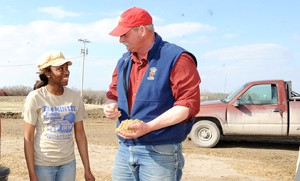
Grooming Next Generation Of Animal Caretakers
When Marshall Ruble started as manager of the beef teaching farm as a new Iowa State grad, he figured he’d stay three or four years. It’s now been nearly 33 years, mentoring hundreds of students to care for the farm’s herd.
The farm provides cattle for 11 undergraduate courses, industry events such as scholarship contests, livestock judging, artificial insemination schools, ultrasound training and ultrasound certification.
“If we can help promote animal agriculture we want to be a presence. We are involved in a few research projects if it doesn’t affect our primary directive of undergraduate teaching,” he adds.
Ruble (’78 animal science) is a native Iowan raised on a diversified livestock farm near Corydon. He especially loves beef cattle, although he’s taken care of sheep, swine, horses, chickens and dairy cattle.
Ruble likes to call his student-workers “projects.” His no-nonsense demeanor doesn’t hide his concern for the students under his charge.
“My success is measured if they’re successful,” he says.
More and more student workers have been added in recent years. Enrollment is at an all time record for animal science and expected to increase significantly this coming fall semester. About 11 students work each semester. Some care for the animals while others maintain machinery. In the summer, students work harvesting forages and bedding for the sheep, swine, horse, beef teaching and beef nutrition farms.
“The students are my labor,” he says, “Without them, we don’t get it done.”
Ruble has been impressed by the students coming from more urban areas, a trend that started about 15 years ago. About a third of the farm’s students are pre-vet, with most coming from animal science majors.
Ashli Jay, an animal science freshman from Miami, wanted to work with cattle in high school. For her that meant going to another school district to join an FFA program. The USDA’s Ag Discovery summer program brought her to Iowa State and she liked it so much Jay decided to apply after high school.
“She started calling me when she graduated, emailing me, wanting a job,” says Ruble.
Jay’s initiative and persistence helped convince him to hire her despite a lack of experience.
“He took me under his wing and helped me with transitioning from Florida to Iowa,” Jay says, even helping her shop for the proper footwear for working on the farm in winter. “I am so grateful for Marshall, I could not have a better introduction to Iowa.”
Ruble estimates he’s had nearly 200 students work at the farm during his 33 years as manager. Many start as freshman and continue working until they graduate.
His first crew set a standard for excellence that he strives to continue:
~Steve Johnson (’81 animal science) is the director of feedyard operations at Cactus Feeders, the largest cattle feeder in the nation
~Dave Judd (’80 animal science) is a Kansas Gelbvieh cattle breeder
~David Edge (’80 farm operation) is owner with his wife, Melanie, of the Western Edge stores, farms and raises horses
Edge still has vivid memories of that first calving season with Ruble.
“I spent a couple summers on a Montana ranch, so I’d rope calves from a pick-up while he drove. After roping, my job was to tag, weigh and tattoo calves all the while keeping as far from the cows as possible,” he says. “They would try to get into the truck. After that year, Marshall began to select for disposition in the herd.”
Edge also took away the importance of record-keeping from the experience, something he applies in his current businesses.
Ruble expects students to learn as well as earn a paycheck.
“Everybody’s going to learn,” he says. “Every job you have hopefully you learn and pick up new things. I always ask them, ‘What do you want to get out of this job today?’.”
Ruble Recognized for Excellence
Dean Wendy Wintersteen presented Marshall Ruble with the Dean’s Citation for Extraordinary Contributions Feb. 16 at the college’s spring convocation. The surprise award recognizes faculty and staff who have exceeded expectations. Maynard Hogberg, chair of the Department of Animal Science, says he nominated Ruble because he’s a dedicated staff member who is a great role model for other employees.
“Marshall Ruble continuously operates the Beef Teaching unit with a positive financial operating balance. He does this with hard work, smart buying and closely monitoring costs of his operation, including student labor,” Hogberg says.
The Beef Teaching cow herd produces genetics sought after by commercial beef producers, Hogberg says, judging by the success of the biannual “Tradition of Excellence Female Sale.” It is conducted with assistance of the Beef Marketing Class that is co-taught by Ruble and Brad Skaar. Ruble also is one of Iowa State’s main contacts for the Iowa beef industry. He has served on multiple boards and committees, including the Iowa Beef Breeds Council where he served at the president.



